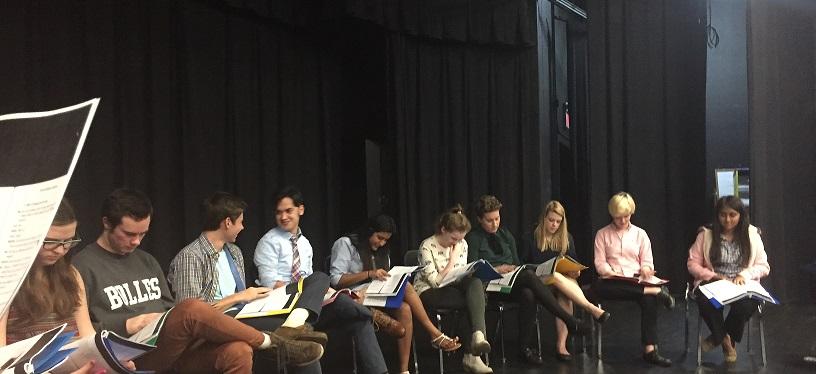The Tough Call: A Look Into the Audition Process
Bolles Bugle Contributing Writer Duncan Evans takes a look into the world of theatre auditions at Bolles.
The cast of Midsummer/Jersey read lines from their scripts.
February 22, 2016
Auditions. That word tends to inspire three possible responses among the Bolles community: the apathetic “Eh” of those who don’t want to perform in front of people or don’t have the time, the joyous “Yes!” and “Oh, cool” of those interested, or the “AAAAAH” (normally internalized) of those afraid of auditioning.
The third response is probably the most common, and is part of the reason you see the same people in many plays– they are experienced and talented, of course, but they are often some of the only ones trying out.
Auditions have a sort of stigma behind them– mostly existing due to pop culture portrayals of auditions; brutal, cutthroat, and grueling hours of waiting for a chance to say five words before being booted off of the stage for “Not having the magic” or what have you. However, this is not the case in most auditions– excluding perhaps those of popular Broadway plays.
The audition process of Bolles plays is simple: show up, sit down, and hang out until you’re told to read from a script. In very few instances will a person even be given a monologue, instead being expected to perform with one or two other people. There is no rush behind the audition process, and no commentary or criticism from anyone. The only case where it is not a “bring only a good attitude” is with musicals, where you are expected to bring a sample of sheet music to sing along to.
The only part that can be deemed stressful about the actual audition is wondering what part you will get– due to the stigma of the crazy audition process, there are not normally more than a couple extra people than are needed for the cast, so it is unlikely you would be cut. Of course, the audition is not the truly stressful part– that comes with the actual dress rehearsals (not the actual performances– by that point you already know the play so well that it is second nature).
Even in the case of their being either too few boys or too few girls as would normally be needed in the play, the Bolles audition policy is “No set casting” in that while some characters simply must be one gender or another, many ancillary characters can be changed around should the play demand it.
Even if one does not want to be in the play, it is still great fun to watch the first runs of scenes with different people than there may be in the final production, and is great to see what new people can bring to the table– or even just hang out with the actors while they are waiting for their turn. For all you students out there, next time you see auditions coming up– don’t be afraid to give it a shot. The only definite way to not get a part is to not show up, and everyone deserves a spot in the limelight.







